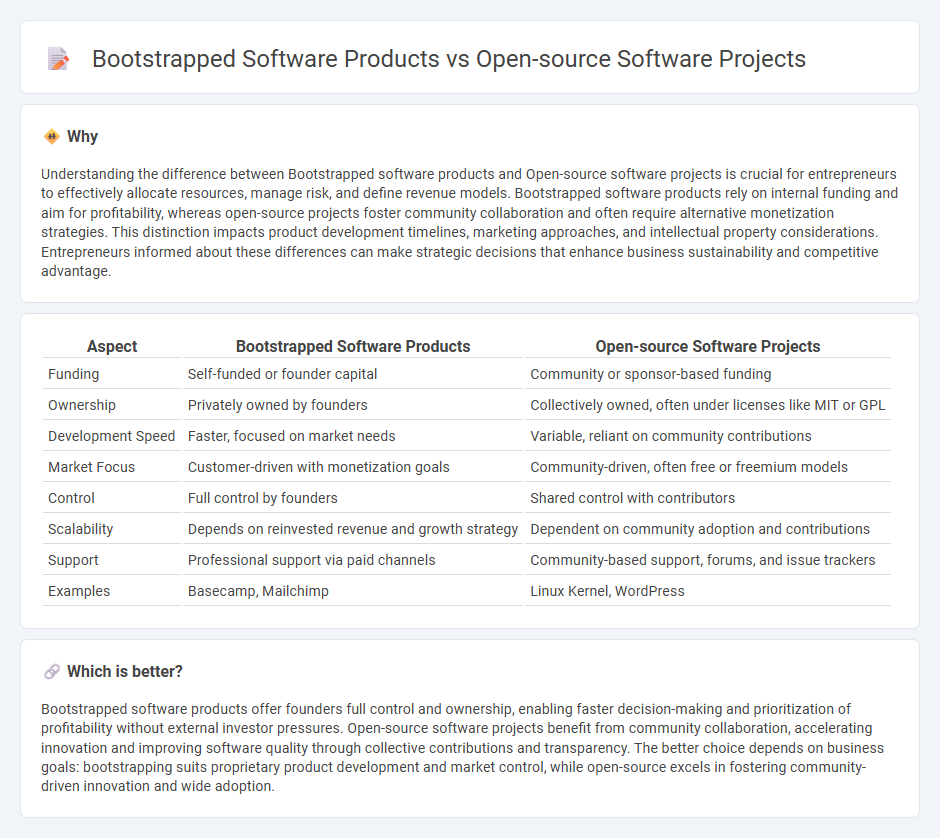
Bootstrapped software products are developed and funded independently by entrepreneurs who maintain full control and ownership, focusing on sustainable growth through revenue generation. Open-source software projects rely on collaborative contributions from a community, promoting transparency and rapid innovation without direct financial backing from the original creators. Explore the unique advantages and challenges of each approach to determine the best fit for your entrepreneurial goals.
Why it is important
Understanding the difference between Bootstrapped software products and Open-source software projects is crucial for entrepreneurs to effectively allocate resources, manage risk, and define revenue models. Bootstrapped software products rely on internal funding and aim for profitability, whereas open-source projects foster community collaboration and often require alternative monetization strategies. This distinction impacts product development timelines, marketing approaches, and intellectual property considerations. Entrepreneurs informed about these differences can make strategic decisions that enhance business sustainability and competitive advantage.
Comparison Table
| Aspect | Bootstrapped Software Products | Open-source Software Projects |
|---|---|---|
| Funding | Self-funded or founder capital | Community or sponsor-based funding |
| Ownership | Privately owned by founders | Collectively owned, often under licenses like MIT or GPL |
| Development Speed | Faster, focused on market needs | Variable, reliant on community contributions |
| Market Focus | Customer-driven with monetization goals | Community-driven, often free or freemium models |
| Control | Full control by founders | Shared control with contributors |
| Scalability | Depends on reinvested revenue and growth strategy | Dependent on community adoption and contributions |
| Support | Professional support via paid channels | Community-based support, forums, and issue trackers |
| Examples | Basecamp, Mailchimp | Linux Kernel, WordPress |
Which is better?
Bootstrapped software products offer founders full control and ownership, enabling faster decision-making and prioritization of profitability without external investor pressures. Open-source software projects benefit from community collaboration, accelerating innovation and improving software quality through collective contributions and transparency. The better choice depends on business goals: bootstrapping suits proprietary product development and market control, while open-source excels in fostering community-driven innovation and wide adoption.
Connection
Bootstrapped software products often leverage open-source software projects to reduce development costs and accelerate time to market by utilizing readily available, community-maintained codebases. Open-source projects provide essential tools, frameworks, and libraries that help entrepreneurs build scalable and customizable software without heavy upfront investment. This symbiotic relationship fosters innovation, enabling bootstrapped startups to compete with larger companies by focusing resources on unique features and customer acquisition.
Key Terms
Community Collaboration
Open-source software projects thrive on community collaboration, leveraging diverse contributions from developers worldwide to continuously enhance code quality and innovation. Bootstrapped software products, while often driven by smaller, focused teams, benefit from direct user feedback but typically lack the widespread collaborative input found in open-source models. Explore the distinctive dynamics of community collaboration in these development approaches to optimize your software strategy.
Revenue Model
Open-source software projects often rely on donation-based models, sponsorship, or dual-licensing strategies to generate revenue, leveraging community collaboration and transparency. Bootstrapped software products typically depend on direct sales, subscription fees, or freemium models, focusing on customer acquisition and retention without external funding. Explore the differences in revenue strategies to understand how each model sustains growth and profitability.
Intellectual Property
Open-source software projects promote collaboration and transparency by making source code freely available, allowing developers to modify and distribute it under licenses like GPL or MIT that govern intellectual property rights. Bootstrapped software products prioritize proprietary ownership, maintaining exclusive control over source code to protect competitive advantages and monetize through licensing or subscriptions. Explore how intellectual property strategies impact innovation and business models in both open-source and bootstrapped software ecosystems.
Source and External Links
16 open-source projects to contribute to in 2024 - Rocket.Chat - Lists key Java open-source projects such as Jenkins, Spring Framework, Elasticsearch, Bazel, and Apache Tomcat, popular for app development, data science, and automation.
20 Open Source projects you shouldn't miss in 2025 - DEV Community - Highlights projects like EsProc, Forem, and Simple Icons with diverse focuses including data computing, community platforms, and brand icon SVGs.
Projects - Microsoft Open Source - Features Microsoft's open-source offerings such as .NET, Visual Studio Code, containerd, Dapr, and tools for security and accessibility in software development.
 dowidth.com
dowidth.com